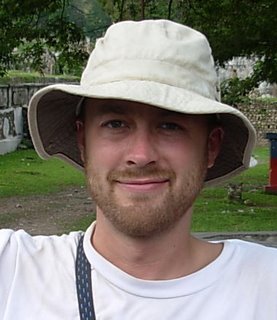The answer is, at this point I'm not doing much. The last week, since returning from the retreat up north, has been my in-country orientation. I've had a few meetings to learn about how MCC policy works, dealing with money, and everything else. I've had two hours of Creole lessons every day. And I've had some cultural lessons and a tour of Port-au-Prince.
But in this short time, I've seen quite a bit. Still, I'm hesitant to write too much about it just yet. White people have a long, long history of coming to Haiti and writing lurid accounts of what they see here. These descriptions are often mere reflections of the writer's own subconscious racism. So I don't want to jump right in and make a bunch of generalizations about anything.
But here's some photos from my tour around Port-au-Prince. This is the memorial to victims of the 91' coup when Jean-Bertrand Aristide was forced from power by the military.

Nearby is this memorial, constructed by Papa Doc Duvalier as a memorial of three hundred years of slavery up until the revolt for independence in 1804. If you haven't read the history of this time, trust me, you won't be disappointed.

This is one of a series of paintings in an Episcopal church downtown depicting biblical scenes in a Haitian setting. This is the wedding at Cana, where Jesus turned water into wine.

I spent a night up in the hills above Port-au-Prince with a couple named Carla and Ron who came to Haiti with MCC to do reforestation about 21 years ago. Below is Carla with Rebecca, MCC's policy analyst for Columbia and Haiti, and Ari, a man who hid in the MCC guesthouse for months during the coup of '91. He was politically active, and his life would have been in danger had he not found Carla.

Now, Ari and Carla do cultural education for people coming to work in Haiti, which is why I went to stay with them. Carla's husband, Ron, does a lot of Creole to English translations. There are a whole bunch of expatriates in Haiti, between missionairies, NGO workers and UN personnel and soldiers. But Ron and Carla are incredibly unique in that for the last 12 years they've been living here unattached to any outside organization or support of any kind. And at times, they just barely scraped by. I'm just guessing, but there can't be more than a handful of Americans in Haiti that are in the same situation.
I can say that at this point I'm happy and (surprisingly) healthy. I feel like most times when I travel, I'm the first in the group to come down with some nasty bug. But so far, with the exception of the devil chicken episode, I'm feeling great.
My lessons in Haitian Creole, or Kreyol Ayisien, have been a lot of fun. I'll write more about the language later too. There's a lot of quirks to it. One is that everywhere I go, people will refer to me as "blan," which means "white." But it's actually just a general word for foreigners. There are UN troops from Senegal here who get called "blan" all the time. And to complete the irony, I'm a "neg." Let me explain. My Creole tutor is a great guy named Jacky Cherie - a kind of renaissance man. I'll post a photo of him, and hopefully a couple of his paintings, up here in the future. We were going over some slang, and he told me that the Creole equivalent of "dude" is "neg." Neg? I asked. Yes, he said. It's literal translation in English is "nigger." Half of the color drained out of my face. Then he calmly looked across the table at me and said, "But here it is not perjorative. You can say it to any man. Kurt, you are a nigger." At this point, the other half of the color drained out of my face, and I didn't quite know how to react, until Jacky started laughing at me. "Don't be embarassed! We're all just negs together here." Funny dude.
So my in-country orientation is done now, though Jacky should be showing up any second for my final Creole lesson in Port-au-Prince. Then tomorrow I head out to the country to spend a month with a family in the Artibonite Valley, outside of a down called Dezam. There's no electricity or running water, and I'll be bathing in a stream behind the house each morning. I'm mostly there to do intensive language study, because when I return I'll go straight to work at RNDDH, where Creole is the only language spoken.
I'm not sure if I'll be able to do any e-mailing or blogging during my month in Dezam, so don't be surprised if you don't hear from me. But please do send e-mails. There's a lot more to share and I'll get right to it once I'm back.
